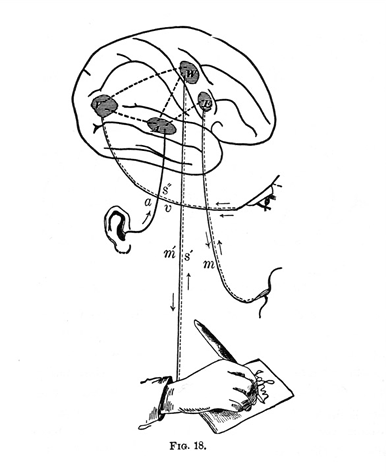Thought to Action

Let me begin with an implicative question. If the fundamental basis of all action is some physical cause, namely the movement of eletrochemical signals to the muscle fibres of the body, then what conceivable potency can an idea or thought possess so that we can consider it as the cause of some action––such as getting out of bed on a chilly morning? To be clear, is thought the cause of action?
The idea of an inherent or genuine link between thought and action traces its roots to the marvellous and insightful work, Principles of Psychology, by William James. Conceived as the “ideomotor theory”, James affirmed that “every mental representation of a movement awakens to some degree the actual movement which is its object”. The significance of this notion is that when we imagine, perceive or represent some action, this in turn “awakens” or excites the motor systems which realise that same action. In James’ ideomotor theory-a theory which links thought and action-plausibly contains within it the implication that actions have their origins in thought. In this regard, thought is the engine of action. However, despite James’ equivocation with respect to the freedom of the will, he hinted at and left open the possibility that both thoughts about actions and the actions themselves may have a further unconscious, but common origin.
Working out of William James Hall in the Department of Psychology at Harvard, Daniel Wegner continued James’ story. Going where James could not bear to go himself, he has argued that the experience of wilful, conscious action is likely to be “the mind’s best trick”, that it is a “sleight of mind”. The experience of conscious will is just an extra add-on to action, but it is not the direct cause of it. Consider that every time you think and feel that you are thirsty, you think about getting a glass of water. You might then walk to the kitchen, grab a glass, open the tap and you pour water into your glass. You raise the glass to your mouth, and take a sip. What if unperceived processes caused both the thought that you are thirsty, and the subsequent action of drinking? How could you ever tell? It would be impossible to tell, as the divergent possible causal paths––one path where thought is the cause of action, and a second path where unperceived processes are the real cause of both thought and action––would appear exactly identical within the interior of our mental life.
The neurosurgeon Wilder Penfield performed astonishing experiments which Wegner believes may support his own conclusion. Within the exposed brain of consciously awake patients, Penfield electrically stimulated their motor cortex to create complex movements in their bodies. The patients commonly reported that they were not the wilful doers of their movements, but that the movements were “pulled out of them”. This apparent disconnect between the introspective reports of the patients and their movements indicates that the experience of conscious will is something added onto action, rather than being the cause of action.
In another experiment, people taking part in a study were asked to move either their left or right index finger whenever a click sound was made by a device as they received alternating trans-cranial magnetic stimulation to their right and left motor cortex. At the time of stimulation, participants reported that they themselves willed their index finger to move, yet they lacked awareness of the alternate influence on their movement.
Wegner believes that we experience and infer an apparent authorship of our actions when three principles manifest: (1) when a thought manifests in consciousness right before an action (priority), (2) the thought is consistent with the action (consistency), and (3) when there is an absence of a discernible alternate cause for the action (exclusivity). When we think of waking up our phones, and we do so, and nothing else is discernibly the cause of the phone screen turning on, we experience authorship of the action. But there are those instances when we wake our phones without thinking, by ingrained habit, or the thought only occurs shortly thereafter, it is on these occasions that we generally lack the experience of authorship.
Further questions:
- Is Wegner’s conclusion the only conclusion which supports the results of Penfield’s and the trans-cranial stimulation experiments?
- In Penfield’s experiment, how were patients able to report an awareness of an external influence on their actions? Is this significant in any way? Why did participants in the latter experiment lack the same awareness?
- Does Wegner’s conclusion definitely sabotage agency in self-monitored complex biological systems, such as mammalian nervous systems?
- If the brain truly generates apparent, but unreal conscious will, how does it do so? What are the systems involved? What are its evolutionary functions?
- Is apparent but unreal conscious will a way for our minds to make sense of the underlying true causal mechanisms that underlie action?
- Is Wegner’s theory a modern, but thinly veiled reproduction of David Hume’s principles of association?
References:
William James (1890), Principles of Psychology, vol. 1 & 2
Daniel M. Wegner (2003), The Mind’s Best Trick: How We Experience Conscious Will. TRENDS in Cognitive Sciences Vol.7 No.2
Uta Frith, Sarah-Jayne Blakemore (2006), “Social Cognition” (ch.7) in Cognitive Systems: Information Processing Meets Brain Science
Cover: ‘Handwriting as physiological habit’, Principles of Psychology (1890, 57) by William James